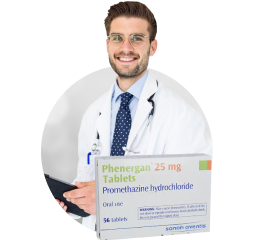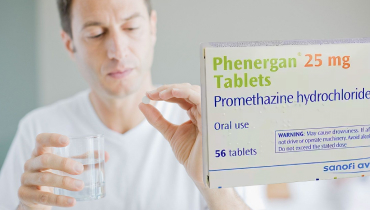What is Phenergan and how is it used?
Phenergan is a prescription medication used to treat symptoms of allergic conditions, nausea, vomiting, motion sickness, pre- and post-surgical sedation, and obstetric sedation. Phenergan can be used alone or with other medications.
Phenergan belongs to a class of drugs called 1st generation antihistamines, antiemetics.
Pharmacological properties
Promethazine is a phenothiazine derivative that differs structurally from the antipsychotic phenothiazines in the presence of a branched side chain and the absence of substitution in the ring. This configuration is thought to be responsible for its relative lack (1/10 of chlorpromazine) of dopamine antagonistic properties.
Promethazine is an agent that blocks H 1 receptors . In addition to its antihistamine action, it has clinically useful sedative and antiemetic effects.
Promethazine is metabolized in the liver to various compounds; promethazine sulfoxides and N-demethylpromethazine are the predominant metabolites found in the urine.
Indications
Phenergan suppositories (Promethazine HCl), USP are used for:
- Perennial and seasonal allergic rhinitis.
- Vasomotor rhinitis.
- Allergic conjunctivitis caused by inhaled allergens and foods.
- Mild uncomplicated skin allergic manifestations of urticaria and angioedema.
- Reduced allergic reactions to blood or plasma.
- Dermographism.
- Anaphylactic reactions as adjunctive therapy to adrenaline and other standard measures after the acute manifestations have subsided.
- Preoperative , postoperative or obstetric sedation.
- Prevention and control of nausea and vomiting associated with certain types of anesthesia and surgery.
- Therapy in addition to meperidine or other analgesics to control postoperative pain.
- Sedation in both children and adults, as well as relief of anxious anticipation and drowsiness from which the patient may easily wake up.
- Active and prophylactic treatment of motion sickness.
- Antiemetic therapy in postoperative patients.
Dosage and administration
Phenergan suppositories (Promethazine HCl) are contraindicated in children under 2 years of age.
Phenergan suppositories (Promethazine HCl) are intended for rectal administration only.

Allergy
The average dose is 25 mg before bedtime; however, 12.5 mg can be taken before meals and if necessary after retirement. A single dose of 25 mg before bedtime or 6.25 to 12.5 mg three times daily is usually sufficient. After starting treatment in children or adults, the dosage should be adjusted to the minimum amount sufficient to relieve symptoms. Administration of promethazine hydrochloride at doses of 25 mg will control minor transfusion reactions of an allergic nature.
Seasickness
The average dose for adults is 25 mg twice daily. The initial dose should be given half an hour before one hour before the intended voyage and repeated 8 to 12 hours later, if necessary. On subsequent days of travel, it is recommended that 25 mg be given upon awakening and again before dinner. Phenergan rectal suppositories (promethazine hydrochloride) of 12.5 to 25 mg twice daily may be administered to children.
Nausea and vomiting
Antiemetics should not be used for vomiting of unspecified etiology in children and adolescents (see WARNINGS – Use in pediatric patients ).
The average effective dose of promethazine HCl for active therapy of nausea and vomiting in children and adults is 25 mg. If necessary, doses of 12.5 to 25 mg may be repeated at 4 to 6 hour intervals.
For nausea and vomiting in children, the usual dose is 0.5 mg per pound of body weight, and the dose should be adjusted for the age and weight of the patient and the severity of the condition being treated.
For the prevention of nausea and vomiting, both during surgery and in the postoperative period, the average dose is 25 mg at 4-6 hour intervals, if necessary.
Sedation
This product relieves anxiety and promotes a restful sleep from which the patient may easily awaken. Administration of 12.5 to 25 mg promethazine HCl rectally before bedtime will provide sedation in children. Adults usually require 25 to 50 mg to relieve sedation at night, before surgery or obstetrics.
Pre- and postoperative use
Promethazine hydrochloride in doses of 12.5 to 25 mg for children and in doses of 50 mg for adults on the eve of surgery relieves anxiety and induces restful sleep.
Preoperative medication in children requires doses of 0.5 mg per pound of body weight combined with an appropriately reduced dose of narcotics or barbiturates and an appropriate dose of an atropine-like drug. The usual adult dose is 50 mg promethazine hydrochloride with an appropriately reduced dose of narcotic or barbiturate and the requisite amount of the alkaloid crassa .
Postoperative sedation and additional use of analgesics may be obtained by prescribing 12.5 to 25 mg in children and 25 to 50 mg in adults.
Phenergan rectal suppositories (Promethazine HCl) are not recommended for children younger than 2 years of age.
Dosage form
Phenergan Rectal Suppositories (Promethazine HCl), USP , available in boxes of 12:
- 12.5 mg , white bullet-shaped suppository wrapped in silver foil.
- 25 mg , white bullet-shaped suppository wrapped in silver foil.
Store in the refrigerator at 2-8° C (36-46° F).
Side effects
Central nervous system
- Drowsiness is the most pronounced effect of this drug on the CNS. Sedation, drowsiness, blurred vision, dizziness; confusion, disorientation, and extrapyramidal symptoms, such as oculogyric crisis, torticollis, and protrusion of the tongue; lethargy, tinnitus, poor coordination of movements, fatigue, euphoria, nervousness, diplopia, insomnia, tremors, seizures, agitation, catatonic states, hysteria. Hallucinations have also been reported.
- Cardiovascular – High or low blood pressure, tachycardia , bradycardia , fainting.
- Dermatological – dermatitis , photosensitivity , urticaria .
- Hematological – leukopenia , thrombocytopenia , thrombocytopenic purpura , agranulocytosis .
- Gastrointestinal tract. Dry mouth, nausea, vomiting, jaundice.
- Respiratory organs – asthma , nasal congestion , respiratory depression (potentially fatal) and apnea (potentially fatal).
- Other – angioedema. Malignant neuroleptic syndrome (potentially fatal) has also been reported (see WARNING for more information.
WARNINGS – Malignant neuroleptic syndrome.
Paradoxical reactions
Increased excitability and abnormal movements have been reported in patients after a single administration of promethazine HCl. Consideration should be given to discontinuing promethazine hydrochloride and using other drugs if these reactions occur. Respiratory depression, nightmares, delirium, and agitated behavior have also been observed in some of these patients.

Drug interactions
CNS depressants – Phenergan suppositories (promethazine hydrochloride) may increase, prolong or enhance the sedative effects of other central nervous system depressants such as alcohol, sedatives/sleeping pills (including barbiturates), narcotics, narcotic analgesics, general anesthetics, tricyclic antidepressants., tranquillizers; Therefore, such agents should be avoided or prescribed in reduced doses in patients receiving promethazine HCl. When used concomitantly with Phenergan suppositories (promethazine hydrochloride), the dose of barbiturates should be reduced by at least one-half, and the dose of drugs should be reduced by one-quarter or one-half. The dosage should be individualized. Excessive amounts of promethazine HCl over the narcotic may result in restlessness and motor hyperactivity in the patient with pain; these symptoms usually disappear with adequate pain control.
Epinephrine – Because of the possibility of promethazine HCl to reverse epinephrine’s vasopressor effect, epinephrine should not be used to treat hypotension associated with promethazine HCl suppositories overdose.
Anticholinergic agents – concomitant administration of other agents with anticholinergic properties should be used with caution.
Monoamine oxidase inhibitors (MAOIs). Drug interactions, including increased incidence of extrapyramidal effects, have been reported with concomitant use of some IMAOs and phenothiazines. This possibility should be considered when using Phenergan suppositories (Promethazine HCl).
Drug/Laboratory Test Interactions
The following laboratory tests may be affected in patients receiving promethazine HCl therapy:
- Pregnancy tests. Diagnostic pregnancy tests based on immunological reactions between hCG and anti-hCG can give false negative or false positive interpretations.
- Glucose tolerance test. Increased blood glucose levels have been reported in patients receiving promethazine HCl.












I received the package a few days ago. Thank you so very much! Everything was perfect. I do appreciate your great service and will most definitely order again from you. I'm glad to say that I can recommend you with total confidence. Thanks
Yeah! The package arrived very quickly. Thanks!
Everything is fine! Thanks!